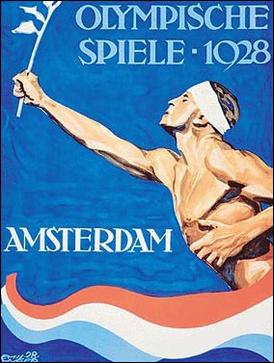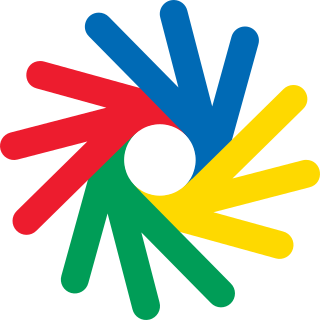
The 1928 Summer Olympics, officially the Games of the IX Olympiad, was an international multi-sport event that was celebrated from 28 July to 12 August 1928 in Amsterdam, Netherlands. The city of Amsterdam had previously bid for the 1920 and 1924 Olympic Games. Still, it was obliged to give way to war-torn Antwerp in Belgium for the 1920 Games and Pierre de Coubertin's Paris for the 1924 Games.

The 1924 Summer Olympics, officially the Games of the VIII Olympiad and officially branded as Paris 1924, were an international multi-sport event held in Paris, France. The opening ceremony was held on 5 July, but some competitions had already started on 4 May. The Games were the second to be hosted by Paris, making it the first city to host the Olympics twice.
Olympic Stadium is the name usually given to the main stadium of an Olympic Games. An Olympic stadium is the site of the opening and closing ceremonies. Many, though not all, of these venues actually contain the words Olympic Stadium as part of their names, such as stadiums in Amsterdam, Berlin, Helsinki and Paris. Olympic Stadium may also be named a multi-purpose stadium which hosts Olympic sports.

Olympic sports are sports that are contested in the Summer Olympic Games and Winter Olympic Games. The 2024 Summer Olympics included 32 sports; the 2022 Winter Olympics included seven sports. Each Olympic sport is represented at the International Olympic Committee (IOC) by an international governing body called an International Federation (IF).

A team sport is a type of sport where the fundamental nature of the game or sport requires the participation of multiple individuals working together as a team, and it is inherently impossible or highly impractical to execute the sport as a single-player endeavour. In team sports, the cooperative effort of team members is essential for the sport to function and achieve its objectives. The objective often involves teammates facilitating the movement of a ball or similar bob in accordance with a set of rules in order to score points. Examples are basketball, volleyball, rugby, water polo, handball, lacrosse, cricket, baseball, and the various forms of football and hockey. These sports emphasize teamwork, strategy, and coordination among team members while competing against opposing teams to achieve a common goal. Team sports do not include individual or individual-to-team events within a sport.

Athletics has been contested at every Summer Olympics since the birth of the modern Olympic movement at the 1896 Summer Olympics. The athletics program traces its earliest roots to events used in the ancient Greek Olympics. The modern program includes track and field events, road running events, and race walking events. Cross country running was also on the program in earlier editions but it was dropped after the 1924 Summer Olympics.

Cycling has been contested at every Summer Olympic Games since the birth of the modern Olympic movement at the 1896 Summer Olympics, at which a road race and five track events were held. Mountain bike racing entered the Olympic programme at the Atlanta Olympics, followed by BMX racing in 2008 and freestyle BMX in 2020. Before the 2020 Summer Olympics, all events were speed races, but the 2020 programme featured BMX freestyle for the first time.

Italy has sent athletes to most of the modern Olympic Games held since 1896, outside of not having officially participated in the 1904 Summer Olympics.

The modern Olympic Games were founded by French historian Pierre de Coubertin. France has competed in every edition, with the possible exception of the 1904 Games.

France was the host nation for the 1924 Summer Olympics in Paris. It was the second time that France had hosted the Games, after the 1900 Summer Olympics, also in Paris. 401 competitors, 373 men and 28 women, took part in 128 events in 20 sports.

The men's 25 kilometres was one of three cycling events, all track cycling, on the Cycling at the 1900 Summer Olympics programme that were open to all amateurs, had more than one nation participating and no handicapping. It was held on 15 September. Ten cyclists competed. Four had already competed in the sprint event. The result of the race proved Louis Bastien of France to be the top long-distance cyclist present, while Lloyd Hildebrand finished in second and Auguste Daumain in third. One of the contestants, Louis Trousselier, would go on to win the 1905 Tour de France. Prizes were awarded to the top four finishers: art objects valued at 400 francs, 300 francs, 200 francs (third), and 100 francs (fourth).

The cycling competition at the 1928 Summer Olympics in Amsterdam consisted of two road cycling events and four track cycling events, all for men only. The individual event in road cycling was a time trial over a distance of 168 km; the team competition was decided by aggregating the times of the three fastest riders from each nation. The 50 km track event held in 1920 and 1924 was replaced by a 1 km time trial.

Belgium competed at the 1924 Summer Olympics in Paris, France. 172 competitors, 166 men and 6 women, took part in 82 events in 17 sports.

Denmark competed at the 1924 Summer Olympics in Paris, France. 89 competitors, 78 men and 11 women, took part in 60 events in 13 sports.

The men's sprint event was part of the track cycling programme at the 1924 Summer Olympics. The field consisted of 31 cyclists from 17 countries. The Vélodrome de Vincennes track was a 500-metre (1,640 ft) loop. The event was won by Lucien Michard of France, the nation's third victory in the men's sprint. His teammate Jean Cugnot earned bronze. Jacob Meijer of the Netherlands took silver, putting the Dutch team on the podium for the second consecutive Games.
The men's tandem event was part of the track cycling programme at the 1924 Summer Olympics.

The men's 50 kilometres event was part of the track cycling programme at the 1924 Summer Olympics.
The men's team pursuit event was part of the track cycling programme at the 1924 Summer Olympics.

The following outline is provided as an overview of and topical guide to cycling:

The First International Silent Games, or First International Games for the Deaf, now referred to retroactively as the 1924 Summer Deaflympics, were the inaugural edition of the Deaflympics. The Games were held in Paris, France, from 10 to 17 August 1924, as an equivalent to the Olympic Games for deaf athletes. They were organised on the initiative of deaf Frenchman Eugène Rubens-Alcais, who, just after the Games, co-founded the Comité International des Sports des Sourds with other "deaf sporting leaders". The 1924 Games were "the first games ever" for athletes with a disability, preceding the World Wheelchair and Amputee Games in 1948, which became the Paralympic Games in 1960 but which did not include events for deaf athletes.

















